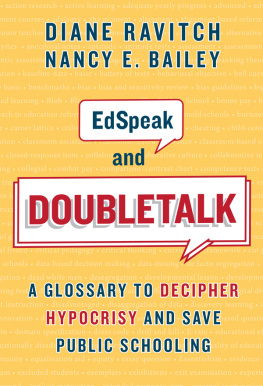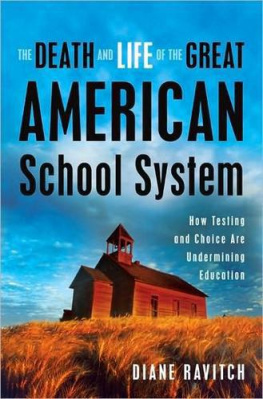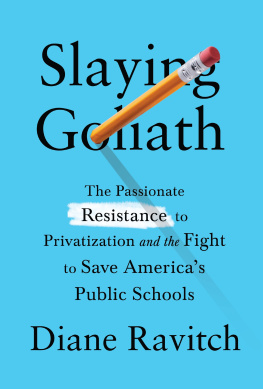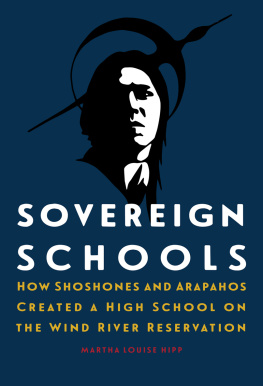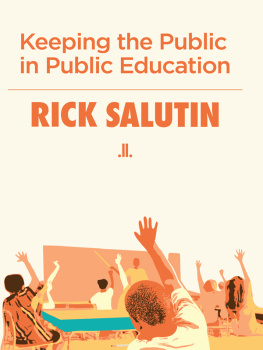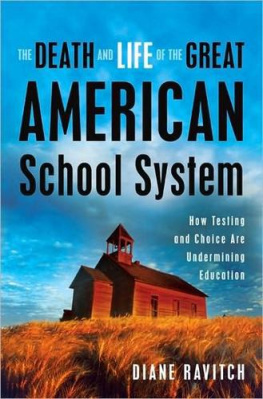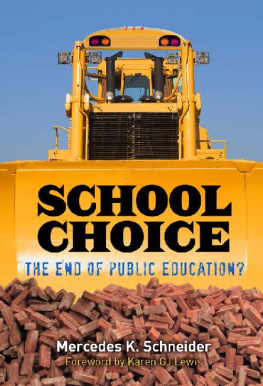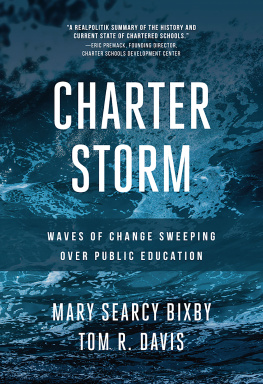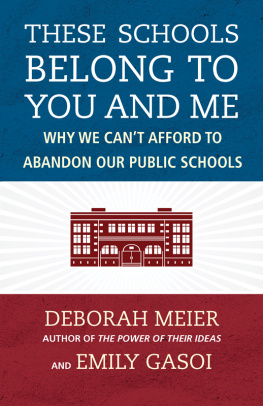EdSpeak and Doubletalk
A GLOSSARY TO DECIPHER HYPOCRISY AND SAVE PUBLIC SCHOOLING
DIANE RAVITCH
NANCY E. BAILEY

Published by Teachers College Press, 1234 Amsterdam Avenue, New York, NY 10027
Copyright 2020 by Teachers College, Columbia University
All rights reserved. No part of this publication may be reproduced or transmitted in any form or by any means, electronic or mechanical, including photocopy, or any information storage and retrieval system, without permission from the publisher. For reprint permission and other subsidiary rights requests, please contact Teachers College Press, Rights Dept.:
Library of Congress Cataloging-in-Publication Data
Names: Ravitch, Diane, author. | Bailey, Nancy E., author.
Title: EdSpeak and doubletalk : a glossary to decipher hypocrisy and save public schooling / Diane Ravitch, Nancy E. Bailey.
Other titles: Ed speak and doubletalk
Description: New York : Teachers College Press, 2020. | Includes bibliographical references and index.
Identifiers: LCCN 2019040179 (print) | LCCN 2019040180 (ebook) | ISBN 9780807763278 (paperback) | ISBN 9780807763285 (hardcover) | ISBN 9780807778197 (ebook)
Subjects: LCSH: EducationUnited StatesDictionaries. | Education and stateUnited StatesDictionaries. | Public schoolsUnited StatesDictionaries.
Classification: LCC LB15 .R286 2020 (print) | LCC LB15 (ebook) | DDC 371.010973dc23
LC record available at https://lccn.loc.gov/2019040179
LC ebook record available at https://lccn.loc.gov/2019040180
ISBN 978-0-8077-6327-8 (paper)
ISBN 978-0-8077-6328-5 (hardcover)
ISBN 978-0-8077-7819-7 (ebook)
Contents
ONLINE SUPPLEMENT
(See the Online Supplement tab at this books page on the Teachers College Press website: tcpress.com/edspeak-and-doubletalk-9780807763278 )
19. Behavior, Discipline, and Socialization
20. College and Career
21. Curriculum
22. Early Childhood Education
23. Educational Research
24. Instructional Terms and Methods
25. Key Historical Leaders
26. Reading and Writing
27. Student Instructional Terms and Methods
Acknowledgments
Diane Ravitch is a fierce fighter for children, teachers, parents, and their public schools. She has been instrumental in supporting the blog posts of writers, parents, and educators who are activists for public schools. As an educational historian, Diane understands the language of education. She has immense knowledge about how schools have been manipulated into becoming entities that focus more on profit than on children. The organization she co-created with Anthony Cody, the Network for Public Education, has become a beacon of hope for those who dream of democratic public schools that all Americans can get behind. So when I heard that she suggested I work with her on the revision of her book EdSpeak , I jumped at the chance!
The language of education defines what public schools are about, and I have always been interested in how such terms are hijacked and turned into definitions that slyly glorify school privatization. Many groups have arisen with a similar purpose of creating a privatized system of unproven choice. Hopefully our research into these words and groups will shine a light on the goals of those who seek to steal from the public their real community public schools. It is our hope that Americans will get behind their schools, invest in them, and become true owners of what belongs to them.
Working with Diane has been an honor and an experience I shall not forget. She has, of course, written extensively about schools and language in the past. I am thrilled that this project will include an ongoing update with additional definitions and new groups, words, and phrases to both push back insidious school reform and stay current with educational language. Check out this books page at the Teachers College Press website ( tcpress.com/edspeak-and-doubletalk-9780807763278 ) and click on the Updates tab.
Bringing clarity to the groups and terms covered in the book should help protect democratic public schools and the teaching profession that we both hold dear. This has made working on this endeavor immensely gratifying.
I would also like to thank my husband, Charlie, who demonstrated incredible patience when listening to me talk so often about public schools, parents, students, and teachers. He is always quick to fairly challenge my thinking, share his opinion, and give me positive feedback about my writing.
Finally, Id like to thank everyone at Teachers College Press, especially our editor, Jean Ward, whose suggestions have always been clear and positive.
I hope this glossary will be beneficial to the many who care about Americas democratic public schools and the efforts to save them. I am grateful to Diane for giving me the opportunity to work with her on this project and look forward to working on the e-book in the future. Gratefulness is also expressed to the reader who recognizes the importance of a well-run public-school system to a healthy nation.
Nancy E. Bailey
Introduction
Like every other profession or specialized field, education has its own language, its own jargon, its own vocabulary, some of which is not comprehensible to outsiders. No one seems to mind that they cant understand the argot of lawyers or doctors or landscape architects or geologists or archaeologists orfor that matterthe latest generation of teenagers. But everyone went to school, and everyone has views about what school ought to be like. And as taxpayers, they certainly believe they should understand the language of pedagogy and educational policy.
Around 2005, I decided to create a guide to educational jargon and buzzwords. It was published in 2006 and called EdSpeak . My goal then was to demystify education vocabulary so that every parent and citizen could understand the language of the professionals.
In the years since, a sea change has occurred in education and in the vocabulary used to describe plans, policies, pedagogy, and priorities. I realized that Edspeak had become obsolete because times had changed. Now, even those in the field of education, whether in practice or preparation, are often unacquainted with some of the real meaning or import of marketing-driven or opaque terminology. They, too, may accept unawares that any seemingly philanthropic foundation or high-sounding nonprofit organization truly promotes the public good and is not manipulating verbiage for its own gain. Sadly, this is not the case. As we share in the following pages, certain intentions of some foundations, nonprofit organizations, and charter holders are not benign.
I was fortunate to find a collaborator, Nancy Bailey, who shared my passion for education, who knew far more than I did about the language of the classroom, and who, as an experienced teacher, had firsthand experience of the impact of policy at the school and classroom level. Nancy is the perfect collaborator because she and I are on the same wavelength. She cares passionately about the integrity of teaching, she understands the debates about how to teach, and she is as dedicated to the improvement of public schools as I am. We have different strengths. I am a historian; I worked in the federal government. She spent many years in the classroom, teaching students with disabilities at all levels: elementary, middle school, and high school. What we discovered is that we complement one another because of our different experiences.

